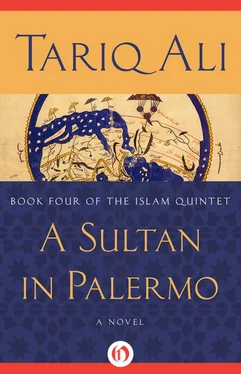‘Never forget that it is sometimes possible to destroy the enemy, not by force of arms which we lack, but by the strength of the knowledge that we have accumulated over the last five hundred years. That is why my friend is still the Amir of Siracusa and Rujari converses with me in Arabic. At the moment our strength lies in this: the Franks have no other way of ruling this island. We must not run away from what lies ahead. You spoke of Ibn Hamdis, but his example is not a good one. The poet of Siracusa was never happy anywhere else. Siqilliya was the mother who fed him, Majorca the aunt whose breasts were milkless. Wherever he went he wrote of Siqilliya. Remember? This is Allah’s country / Abandon its spaces and / your aspirations to e arth will be shattered. And later in the same poem he writes: Chain yourself to the beloved homeland / Die in your own abode / And as the mind refuses to try out poison / Reject the thought of exile. He is not a good example. He was never happy anywhere else.’
But Khalid’s father was not prepared to surrender so easily.
‘Respected father, how would you respond to the words of Abd al-Halim? I loved Siqilliya / In my first youth she seemed a garden of eternal felicity / Scarce had I reached maturity / Behold, the land became a burning gehenna.’
Idrisi smiled. ‘Good sentiments do not always make good poetry, my son. I agree with your poet, but to state the obvious is not a solution.’
Those within this small circle who spoke later merely repeated in different words what Idrisi had already stated. No decisions were made and nothing irrevocable said. If a Nazarene had been present, there was little he could have reported that had not been said before on many occasions. And yet underlying everything was a silent, formidable struggle between those who wanted to unleash an armed resistance now and those, like the mapmaker from Palermo, who argued that nothing should be attempted while Rujari still breathed. The Amir rose and said farewell to his guests.
Idrisi embraced the two young men and invited them to breakfast the following morning. They informed him that they had brought their sons along with them, which pleased him greatly. ‘Bring them with you tomorrow. Your sons are a living proof of an old saying: they are the product of a combination in which the stronger element has, Allah be thanked, subordinated the weaker with which it was forced to be in contact.’ A burst of spontaneous laughter from his sons-in-law pleased Idrisi. He had been thinking of composing a treatise on laughter. The role it played in everyday life. Laughter as a disguise, as a retreat, as an escape. Polite laughter to please the Sultan or the Amir or the Baron or the qadi or one’s own father/grandfather/great-uncle. Malicious laughter to strike down an enemy.
The laughter of women, in particular, was severely curtailed. It was not permitted when outsiders or male elders from the family were present. Women could cover their mouths with a hand and smile, but not laugh. Idrisi recalled his childhood. The women of the household constantly regaled each other with the bawdiest of jokes, but fell silent when his father or uncle entered their space.
As he prepared for bed he thought about how he knew Mayya belonged to him when she had laughed in the most abandoned way during the months of their secret courtship, when she was sixteen and he had just marked his twenty-second year. She had never been formal with him, then or now. But why had the laughter been so decisive? Of course, the women in the harem ignored all conventions, often punishing eunuchs who could not make them laugh and insisted on everything being laid bare. But they were a special case. Idrisi was determined to find out whether the restriction on laughter was something confined to the towns or whether the same rules applied in the villages. The poets of the past had made no secret of the fact that in the desert encampments of the old tribes, the women laughed, sang, fought, fornicated and traded, just like the men.
The conquest of the towns had changed all that. Everything was carefully controlled. Including laughter? Possibly. The desire to control women obviously meant controlling their laughter as well. Nor was it just that of women. Slaves, retainers, peasants, soldiers, none of them laughed openly in front of their masters. Laughter was also an indication of equality and intimacy. Only equals could laugh together.
And yet some inner voice told him that it was still different in the desert or the mountain villages of Siqilliya. If only he had the time he could explore the interior of the island as thoroughly as he had studied its coasts. He was tired of plants and trees and the structures of rock formations and yes, even maps. More than anything else he wanted to speak with his people. To hear from their own lips how their lives had changed since the Franks had conquered the island. Ibn Hamdis was far too harsh on the Hauteville tribe that ruled over them. It could have been much, much worse and would be if they were replaced. Of that he was sure. Philip understood that better than anyone else. The thought that troubled him as he lay in bed trying to sleep was how long the Popes and Emperors of the Holy Roman Empire would permit this strange hybrid to exist. The irresistible expansion of the Church had been retarded, not extinguished, by the armies of the Prophet.
The muezzin woke him at dawn and try as he might, he could not go back to sleep. Instead he bathed, dressed and walked in the garden within the palace enclosure. The Amir, having completed the morning prayer, sighted him from the balcony of his bedchamber and came down to join him. Idrisi had taken an instinctive liking to the man and could not understand why Ibn Fityan had any doubts about him. True, a choice confronted those whose leadership was respected by Believers. The conquest had thrown them off balance, but it was the qadi of Palermo who had decided to surrender the city to Rujari’s father on terms that were not as unfavourable as those imposed on Salerno. If the Believers had not surrendered, the Franks would have burnt the town and killed everyone. Would that have been better?
‘Why did we lose Siqilliya?’
The Amir had not disturbed his thoughts, but entered them. Idrisi looked at him and smiled. ‘Because we could not take Rome. Our ships were moored on the Tiber, but we were morally too weak to take advantage. They bought us off with sacks of gold. If we had taken Rome, our armies would have marched South and prevented the intrusion of the Franks.’
‘And the Pope?’
‘He would have worked with us till a more powerful force emerged.’
Both men laughed at the thought.
‘Our faith,’ Idrisi remarked, ‘inspired devotion and conquests, but it is like a hurricane. Transient.’
‘Let me ask you something, Ibn Muhammad. I appreciated your discretion last night. Everyone present was loyal, but it is better not to take risks. If they burn Philip it will be difficult to control the anger of our people.’
‘But why? As far as they are concerned Philip is a Nazarene just like the Sultan. Might not some think it’s good they’re killing each other?’
‘You underestimate the intelligence of our people. Few believe in Philip’s conversion. I have noticed that those who do are themselves converts from our faith. What matters is what they say to each other at home or in the bazaar. And here as well as in Palermo and in the lesser cities, they whisper to each other that Philip remains a Believer. His punishment will only confirm this belief.’
‘You are right, my friend. In fact, that is what they are going to charge him with.’
‘There will be a response.’
‘In Siracusa?’
‘I will keep the city under control because anything that happens here has much graver implications. But your two sons-in-law will be able to give you much better information. And later today, my sister-in-law arrives with our niece Elinore. It would be a great honour if you ate with my family tonight.’
Читать дальше












